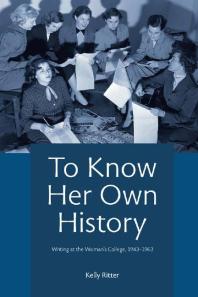(Ebook) To Know Her Own History. Writing at the Woman's College, 1943-1963 by Kelly Ritter ISBN 9780822977872, 0822977877
To Know Her Own History chronicles the evolution of writing programs at a landmark Southern women's college during the postwar period. Kelly Ritter finds that despite its conservative Southern culture and vocational roots, the Woman's College of the University of North Carolina was a unique setting where advanced writing programs and creativity flourished long before these trends emerged nationally. Ritter profiles the history of the Woman's College, first as a normal school, where women trained as teachers with an emphasis on composition and analytical writing, then as a liberal arts college. She compares the burgeoning writing program here to those of the Seven Sisters (Wellesley, Smith, Radcliffe, Barnard, Vassar, Bryn Mawr, and Mount Holyoke) and to elite all-male universities, to show the singular progressivism of the Woman's College. Ritter presents lively student writing samples from the early postwar period to reveal a blurring of the boundaries between "creative" and "expository" styles. By midcentury, a quantum shift toward creative writing changed administrators' valuation of composition courses and staff at the Woman's College. An intensive process of curricular revisions, modeled after Harvard's "Redbook" plan, was proposed and rejected in 1951, as the college stood by its unique curricula and singular values. Ritter follows the plight of individual instructors of creative writing and composition, showing how their compensation and standing were made disproportionate by the shifting position of expository writing in relation to creative writing. Despite this unsettled period, the Woman's College continued to gain in stature, and by 1964 it became a prize acquisition of the University of North Carolina system. Ritter's study demonstrates the value of local histories to uncover undocumented advancements in writing education, offering insights into the political, cultural, and social conditions that influenced learning and methodologies at "marginalized" schools such as the Woman's College.
*Free conversion of into popular formats such as PDF, DOCX, DOC, AZW, EPUB, and MOBI after payment.


